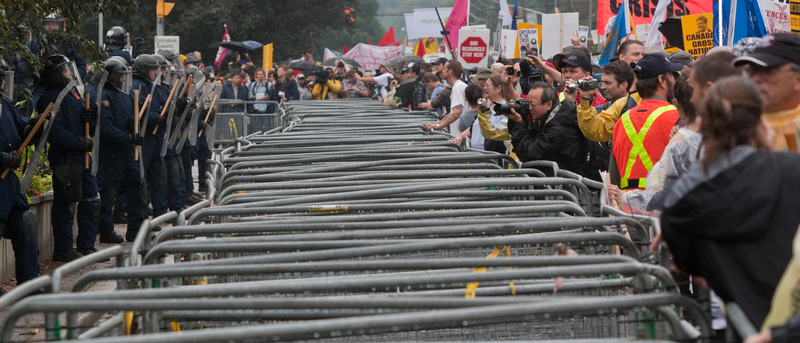Canada’s protest culture misunderstood

 If you turn on the news right now it won’t take long before you see something that registers with you on an emotional level. The phrase “If it bleeds, it leads” does more than just describe the tendency of using violence in the news to grab the public’s attention, it also indicates a broader symptom of our culture: A hypersensitivity to conflict and a social reinforcement of critical or dismissive reactions to sensational stories.
If you turn on the news right now it won’t take long before you see something that registers with you on an emotional level. The phrase “If it bleeds, it leads” does more than just describe the tendency of using violence in the news to grab the public’s attention, it also indicates a broader symptom of our culture: A hypersensitivity to conflict and a social reinforcement of critical or dismissive reactions to sensational stories.
It is too easy to passively bring up news stories in conversation and without much criticism from your peers, you can make comments based on information from a few minutes of CBC television or a KONY 2012 video.
This is largely because Canadian society tries to project an image of moderation and peace to define our national character.
We are, therefore, led to assume some quality of distinction from other societies who adopt more radical policies, and quickly jump to defend the status quo without much inquiry into the context of the violence being denounced.
Regardless of the reason for this mainstream acceptance of judgment being cast on completely foreign issues, it should be recognized that it is an impediment to understanding different cultures around the world and contributes to a growing sense of powerlessness and alienation from global politics.
Without the historical elements of conflict, would we not otherwise be tempted to believe that violence is nationally or ethnically determined? And that a person who engages in violence is somehow different from one of “us” at the fundamental level?
The young generation of North Americans, a generation that has grown up with cellphones, the Internet, video games, mass media and social networking technology do not participate in politics the same way the previous one did.
Typical discussions are more about ourselves, like a pseudo-Facebook status update.
The historical context that many of us fall back on to describe our world today involves references to the First and Second World Wars, the Cold War and 9/11.
These particular events are among the most represented in Western culture, with cinema blockbusters about the Allies’ triumph over the Nazis shown in high school history class, or with adolescent youth fighting Russian nuclear threats in hugely popular video game franchises like Call of Duty.
It begins to seem that the conflicts that we discuss in our society are either dramatized to mythical proportions or they are harshly criticized as being distinctly un-Canadian.
In the 21st century Canada has developed a new dimension of what has been called “riot culture,” or more appropriately, “protest culture.”
With assemblies at the Toronto G20 Summit in 2010, which resulted in the largest mass arrest in Canadian history and with the current demonstrations in Quebec, people are showing support for more public empowerment in politics. But when we hear news of these protests we are often convinced to discredit the movements absolutely based on vague reports of violence or because of a talking point statistic.
The problem is that we do not hear about how protests in Canada have been poorly handled, such as in the case of the Toronto G20 Summit, until much later when the media buzz has already been killed. Or we hear that Quebec pays the lowest tuition rate in Canada rather than the bigger story of university costs rising nationwide by a margin that exceeds inflation.
Similarly, protests that do not attract as much controversy are swept under the rug, like the Aboriginal Day of Action in 2007 when the Canadian First Nations organized an assembly to represent land rights issues peacefully and were policed largely without confrontation.
At the end of the day, when you reflect on the stories you have heard, it is important to remember that your greatest power is in your ability to not participate in their judgment.
And, especially when you feel a news report is too sensational or controversial and provokes an emotional reaction, it is a matter of honesty to approach the conflict with a curious mind and at least try to read past the headlines before you cast your judgment.
Empathy for political movements is not a subjective bias; rather, it is an openness to listen for the context of an idea and the story it tries to tell.



